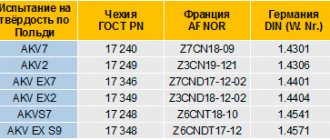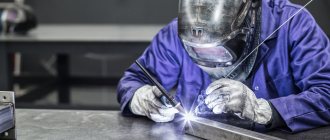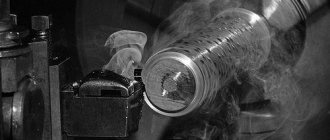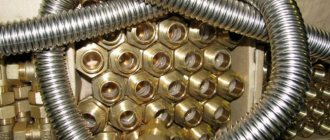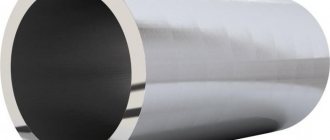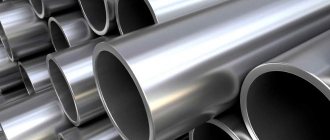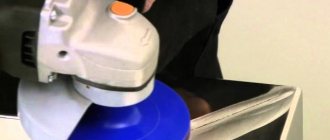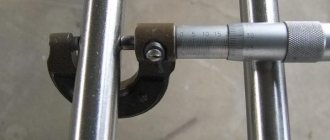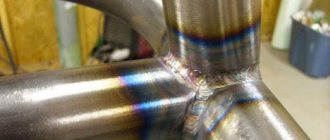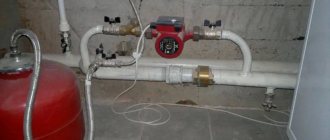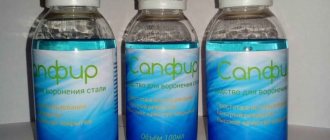It seems to many that corrugated pipes are a relatively recent product on the plumbing market. In fact, corrugated pipes have long been firmly established in every home as a shower hose. Corrugated stainless steel pipes for heating came into use a decade ago, successfully replacing smooth-walled counterparts in modern engineering systems. Let's figure out what benefits the use of corrugation brings, what it comes in, and why its installation is considered simple.
Connecting a radiator through a corrugated pipe Source metallobaza-sm.ru
Varieties
The industry produces two types of corrugated stainless steel pipes, differing in the method of technological processing:
- Annealed. After additional heat treatment, the metal becomes softer and more ductile (however, such products are one and a half times more expensive than conventional analogues). If the system is designed with turns, the pipe will successfully withstand the kinks and remain intact.
- Unannealed. Externally, they cannot be distinguished from products that have undergone additional heat treatment. They hold their shape well and practically do not sag between the support points, maintaining a horizontal state (if the areas are not too long). It is better to avoid them if the system is complex and has many turns, since deformations will form at the bends.
The main characteristic of flexible heating pipes, rigidity, depends not only on the heat treatment, but also on the wall thickness (more precisely, on the thickness of the sheet from which the corrugation is made). The thickness varies between 0.13-0.5 mm. The higher the parameter, the worse the corrugated spiral bends. There is an advantage to this: the stiffer the product, the better it retains its shape.
Fragment of corrugation with fitting Source laminatepol.ru
Features of corrugated pipes
Corrugated culverts originated in Japan many years ago. Since then, they have become indispensable not only in the markets of this Asian country, but also in Western countries, including the European market.
The main features of these components of any modern water supply system lie in their unsurpassed characteristics. They can be used for a variety of purposes, because they are very reliable, strong and durable.
Another feature of corrugated pipes is a wide selection. Each buyer will be able to find products of various diameters on the market. This will allow for the installation of a wide variety of communication systems. It is difficult to find more suitable technical equipment that would cope with this task.
Information about the joining of such products deserves special attention. This is possible using special fittings made of brass. They have all the necessary characteristics to cope with this task perfectly. In addition, they have a very simple design.
Performance characteristics
Stainless steel corrugation is considered a convenient and inexpensive substitute for classic heating pipelines (especially when compared with copper ones). The practicality is obvious: in terms of performance characteristics, stainless steel is not inferior to copper, but in terms of finance it is many times more attractive. The use of high-quality metal corrugations allows you to obtain a reliable system while maintaining its reasonable cost.
Standard corrugation in the mid-price segment (for household systems) has the following characteristics:
- Diameter: 15, 20, 25, 32 mm. Large diameters (up to 100 mm and above) are rarely used. There is a concept of external and internal diameter. For example, a product stated to have a diameter of 12 mm has an outer diameter of 16.2 mm and an inner diameter of 11.8 mm.
- Wall thickness: 0.25-0.3 mm.
- Working pressure – 15 bar (atmospheres). An excess of up to 50 bar is permissible. Some products (Korean, Japanese) are able to withstand a short-term increase of up to 200 bar, but then they collapse.
Corrugated stainless steel pipe for heating Source twimg.com
- Coolant temperature: +110 °C.
- The operating temperature for corrugated material ranges from -50 to +110 °C.
- It is also important to consider the purpose, corrugation pitch, coil length and bending radius.
Leading manufacturers
Stainless steel plumbing will be truly reliable only if it is made from the highest quality pipes. The best corrugated culverts are produced by only a few global manufacturers.
- The company KOFULSO LTD from the Republic of Korea is considered one of the recognized world leaders. These products can be purchased on the domestic market for quite a long time (more than 5 years)
- GOFRA-FLEX is another manufacturer from the same Korea. This company is concerned about obtaining special certificates both in the EU countries and in the USA, Russia and other countries.
- Not everyone knows about the Russian brand NEPTUN IWS, but this company has already established itself in the best possible way. Its materials for both household and industrial use allow you to achieve excellent results in any situation.
Application and labeling
Stainless steel corrugation is used in the following cases:
- When installing heating systems of private houses, bathhouses, greenhouses (usually a product with a diameter of 20 mm is used). They help connect heating appliances to the heating riser.
- When installing standard water supply pipelines and connecting plumbing fixtures.
- When installing heated floors and varieties (warm walls, baseboards); in heating radiators.
- As cable ducts for protecting electrical cables.
- In fire extinguishing systems as a fire-fighting pipeline.
- When laying communication networks.
- In gas supply systems.
- In internal combustion engines: transports fuel and removes exhaust gases.
Product markings indicate how they can be used:
- With the letter "A". The corrugation is made of unannealed steel.
- With the letter "M". Annealing technology was used.
Connecting a corrugated pipe to a fitting Source prodomostroy.ru
- With the letter "P". The pipe is protected by an additional plastic sheath.
- With the letter combination “El”. For electricians.
See also: Catalog of companies that specialize in engineering systems (heating, water supply, sewerage and others) and related work
Features of corrugated stainless steel unannealed pipe
We will continue the topic of what are the differences between stainless steel corrugated annealed and unannealed pipes by considering the second type of these products. Structurally, unannealed pipes differ only in the shell material. Steel that has not undergone heat treatment is more rigid. Pipes of this type require a larger bending radius, which creates inconvenience when working with them in cramped conditions. They cannot be used for rolling joints because the unannealed corrugated casing has insufficient ductility.
If you make a mistake when bending unannealed pipes, then after alignment, visible traces of previous bends will remain on the corrugation. Therefore, such work requires special care.
As for marking, unannealed pipes are indicated by the following symbols:
- GF at Lavita;
- A at Kofulso;
- TN at Hydrosta.
Let us remind you that there are no external differences between the two types of pipes, but they exist for products designed for different installation conditions and main intended purposes. We must also remember that, other things being equal, the cost of a meter of unannealed corrugated pipes is approximately 10% lower than that of annealed products.
pros
Stainless corrugated piping technology is attractive for the following reasons:
- The product is not subject to corrosion due to the metal - ordinary, stainless or galvanized steel. Stainless steel corrugation has the highest corrosion resistance.
- An important property of pipes is durability. The service life of the system is virtually unlimited, and is determined by the service life of the couplings used for crimping. Some parts (O-rings) are designed to last 50 years.
- Economical technology. Construction budgets are saved due to overall low metal consumption and reduced assembly time. According to experts, costs are reduced by 20-25%.
- The products are ideal for organizing heating and plumbing systems. A stainless steel corrugated pipe for water supply has characteristics that allow it to cope with temperature fluctuations (up to freezing of the coolant) and water hammer.
Flexibility is one of the main advantages of corrugation Source amazon.com
- Practicality during use. The pipes are flexible and resist static and dynamic loads well. Bends do not affect the permeability, therefore, when using corrugated products, you can avoid fittings (connecting parts).
- The weight of corrugated pipes is insignificant, comparable to some types of polymer analogues.
- Due to the high heat transfer coefficient of metal, corrugated pipes are effective in heating systems.
- The smooth inner surface prevents the section from overgrowing; hydraulic resistance remains minimal. Pipes do not require additional flushing.
- Installation is as easy as possible; Standard fittings are used for connections. Thanks to its flexibility, utility lines can be laid in hard-to-reach places. The number of connections has also been reduced.
Material with a polymer shell of different colors Source atmosfera.ua
Technology for making pipes for water supply
The manufacturing process of stainless steel corrugated pipe products is fully automated. The absence of the human factor ensures high accuracy in performing basic technological operations.
The most reliable products are those made in Japan. But the products of companies from Latvia meet the price-quality ratio.
The production of stainless pipes for water supply consists of several main stages:
- At the first stage, the steel strip is pre-treated. After this, the workpiece is fed to the forming line, where the belt is bent to obtain a cylindrical workpiece.
- Then the joint is welded. This process occurs automatically in a special environment of inert gases.
- Next, the smooth-walled workpiece is rolled using parts of different diameters. The result of this process is corrugated stainless steel water supply pipes.
- The final stage is cutting the products into pieces of a certain length. Most often it is cut into pieces of no more than 50 m, which are wound into a bay. This makes it more convenient to transport the material and also facilitates installation work.
The depressions and protrusions may have different parameters, since each manufacturer produces products in accordance with its Specifications and Standards. It is worth noting that this does not in any way affect the quality of pipe products.
Minuses
The disadvantages include the following features:
- Stainless steel is not a cheap raw material, and a corrugated stainless pipe for heating from the best manufacturers costs a decent amount.
- If you plan to design a heated floor, experts recommend using corrugation in a polyethylene braid that protects against contact with chemically active substances. In addition, the concrete screed should be replaced with a “dry” installation method.
- Corrugated pipes have an “industrial” look that will not fit into every design. On sale you can find corrugated polymer shells in different colors, which leaves some room for maneuver.
- The recesses between the corrugation rings sooner or later fill with dust, which is not so easy to clean out.
Difference between annealed and unannealed pipes
For the production of corrugated pipes, high quality stainless steel is used, regardless of what kind of product should be obtained at the end. After creation, some of the products are subjected to heat treatment. This is necessary to soften the material.
The annealed one bends better. It is used when it is necessary to lay complex sections with bends. Due to the relatively high price compared to unannealed ones, it is not rational to use annealed pipes for the installation of straight pipelines, but according to the technology it is possible.
Installation subtleties
Sometimes the flexibility of corrugated pipes for heating or water supply turns from an advantage into a disadvantage, which must be remembered in the following situations:
- In difficult places in the system, do not repeatedly bend the corrugated part. During operation, this place will be a weak link, since bending loads will exceed permissible values.
Heat exchangers for heating a private house (in a brick oven) Source ytimg.com
- If there are children in the house, it is worth considering how to secure the system. Children's imagination can easily turn a flexible part into a convenient support or crossbar. Sooner or later, fatigue will accumulate in the material with all the ensuing (in every sense) consequences.
Installation of corrugated stainless steel pipes for heating includes the following operations:
- A piece of the required size is cut from the bay, for which a grinder or pipe cutter is used. If necessary, the cut site is cleared of burrs.
- The pipes are connected using fittings. In this case, you must ensure that the diameters match and the union nut is tightly tightened.
- If necessary, the pipeline is fixed to the wall using brackets.
- Lastly, water is supplied to make sure the joint is tight.
A pipe cutter allows you to obtain a cut without deforming the pipe Source rothenberger-russia.ru
Advantages and disadvantages
The main advantages of flexible stainless steel tubes:
- Resistance to corrosion even during long-term operation and constant temperature changes in the system.
- Ideal flexibility, thanks to which you can install plumbing even in the most difficult places and areas of the house.
- Opportunity to buy a coil of pipe 50 m or more in length and lay an extended section of water supply.
- Easy to install and does not require special skills or special tools.
- Minimum number of connections in the pipeline.
- Possibility of installing flexible pipe systems with a maximum pressure of 15 bar.
- Heat resistance of stainless steel. The material is suitable for use at temperatures up to +110 degrees.
- There is no high voltage on the metal at the junction of corrugated pipes with conventional ones.
- Low noise level of the transported medium.
- Light weight.
- Service life from 20 to 30 years.
But with all the positive aspects, flexible steel tubes also have a number of disadvantages:
- It is prohibited to use metal corrugation in places with increased mechanical load. This may cause it to become unusable, or you will have to additionally protect the material from the outside.
- Accumulation of dust in the grooves of the corrugation. It is more difficult to maintain such pipes. For these purposes, it is advisable to buy a special soft brush.
- Low level of aesthetics of flexible tubes. You can't leave them open. You can correct the situation with the help of a plumbing box.
- The need to regularly check the tightness of plastic connections made using polymer union nuts. They may fail. It is necessary to frequently tighten the nuts until they stop, and sometimes change worn gaskets.
- High cost of products. Compared to conventional polymer pipes, flexible pipes are much more expensive.
- The need to insure elements from the effects of harmful electrochemical corrosion. Otherwise they will require replacement.
- Heat loss when using tubes for heating systems when transporting high-temperature coolant through them.
Flexible steel pipes should never be embedded in a screed. They must always be accessible. Otherwise, the need for complex, labor-intensive repairs in the event of an emergency cannot be ruled out.
Purchasing: what to look for
When purchasing any components, make sure that they have a certificate of conformity. It is convenient to evaluate the quality of corrugated pipes according to the following criteria:
- No obvious defects (deformations, chips) upon visual inspection.
- Seam quality: choose products with smooth and unbroken seams.
- A high-quality coil has ease of bending: if you bend and release the fragment, it will return to its original position.
- Pitch uniformity: correct when the spacing between the rings remains the same anywhere in the bay.
Check not only the characteristics, but also the integrity of the packaging Source vseinstrumenti.ru
Pay attention to the labeling. Since it cannot be applied to a corrugated surface, all relevant information is printed on the coil wrapper. It is not advisable to purchase a corrugated pipe for heating if the container is damaged. This may indicate substitution, a desire to pass off a cheap product as a high-quality one.
Open-end wrenches are used in installation work; you will also need a cutting tool; It is best to stock up on a pipe cutter - it can make a cut at a right angle. The stability of the system is determined by the fittings, and there are also certain requirements for them.
The surface of the fitting must be smooth; any damage to the gaskets is unacceptable. Experts recommend giving preference to brass fittings, as they provide better tightness: in the future you will not have to periodically check and tighten the joints.
Connecting (clamping) fitting helps to assemble complex routes Source proteplo33.ru
How to make a corrugated pipe from stainless steel
The raw material for the product is usually AISI 304 sheets. This material is similar to domestic stainless steel 12×18n9. Due to the high content of alloying elements, including nickel, the material is durable, corrosion-resistant and is not afraid of temperature changes (from -50 o C to +110 o C).
Pipe manufacturing occurs in several stages:
- The metal strip is fed into special machines that form it into a cylindrical blank;
- The workpiece is welded in a gas environment;
- The rollers form a steel corrugation;
- The product undergoes heat treatment to impart the necessary flexibility;
- The finished pipe is checked for the presence of microcracks and the quality of the weld. Control takes place in a liquid environment under pressure;
- The pipe is cut and rolled into coils.
A mandatory procedure after completing all technological operations is quality control of the finished product. At this stage, it is tested under pressure - placed in a liquid medium and monitored for the presence of microcracks in the walls.
Briefly about the main thing
Corrugated steel pipe is an advanced engineering communication that combines usually incompatible properties: strength and flexibility. The material is convenient to install and operate in different types of systems; it lasts for decades and remains resistant to chemical corrosion all this time. The property is especially valuable for the use of water supply and sewer systems.
Corrugated material has gained popularity due to its ability to withstand heavy loads, as well as quick installation and a reduction in the number of connection points. Such capabilities simplify the creation of complex configuration systems, which is especially important for plumbing or heating in a private home.
Why do you need corrugation?
Laying electrical cables and wires in corrugated areas is recommended for various reasons:
- When laid in flammable walls (wooden or frame), behind flammable finishing (lining, PVC boards), when attached to wooden floors - for fire safety reasons. In this case, non-combustible shells are chosen.
- When laying behind finishing materials - behind lining, plasterboard, PVC boards, etc. - for security reasons. To make it more difficult to damage the cable when trying to hang something on the wall. In this case, the most important indicator is the hardness of the shell.
Corrugated pipes for electrical wiring come in different colors. It's for a reason, colors have meaning. - When laying cables in a screed or under the floor, under finishing, corrugation is used for several purposes. Firstly, to protect against compression when pouring concrete. Secondly, to be able to change the cable if it is damaged without destroying the floor. Third, to protect against damage.
- When laying externally, the sheath is needed to protect the cable from atmospheric influences (ultraviolet) and mechanical damage. When laying open through the air, a corrugation with a wide temperature range (to withstand heat and frost) and durability are required. to ultraviolet. If the cable is suspended, reinforcement is also necessary to increase the load-bearing capacity.
- When laying underground, water resistance as well as rigidity are important.
When laying rigid corrugation on turns, it is better to use special couplings
In general, corrugation, even metal, is not the best protection against mechanical destruction. You can only hope that if you feel that the drill has failed, you will be able to stop in time. And in order to definitely not get into the electrical wiring, it is better to have an exact plan for its installation with measurements and reference to the corners. After all, not every wiring detector detects a corrugated cable, even under load. So, before pouring the screed, before finishing, don’t forget to take photographs, sketches and mark distances.
